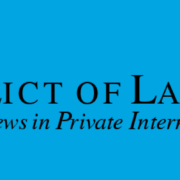New Canadian Conflicts Text
The Irwin Law “Essentials Series” is a collection of texts about Canadian law aimed at a broad audience: it includes law students and also lawyers, judges and academics. It has been quite successful over the past twenty years. In 2024 Irwin Law was acquired by University of Toronto Press. It has continued the Essentials Series and the use of the Irwin Law imprint.
It has now published the third edition of Conflict of Laws written by Professor Stephen G.A. Pitel of Western University, Canada. The second edition was published in 2016 and so this edition updates almost a decade of activity, mainly from courts across Canada. The major change is that the chapter on declining jurisdiction has been reorganized and updated in light of the Supreme Court of Canada’s decisions in Douez v Facebook, Inc (2017) and Haaretz.com v Goldhar (2018). All chapters have been updated to reflect new decisions, legislative changes and recent scholarship.
More information is available here. For those outside Canada, the book is a clear and accessible source of comparative conflict of laws analysis.



